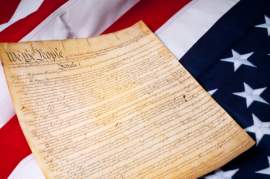
Fourteenth Amendment

Popular In Constitution
Purpose Of Lifetime Appointment And Pros And Cons Enumerated Powers Bicameral Legislature Background Article 3 Of The Constitution We The People 1st Amendment Who Wrote The Constitution Judicial Review Equal Protection Clause 5th Amendment 10th Amendment Three Fifths Compromise
The Fourteenth Amendment is another of the Reconstruction Amendments which were adopted after the Civil War. The 14th Amendment was proposed on June 13, 1866. It was finally ratified by three-fourths of the states on July 9th, 1868.
The Fourteenth Amendment has been commonly argued as the most important piece of legislation in the Constitution, and quite possibly, the most important of all laws in the United States. Its original purpose was to simply define what United States citizenship was, and provide for an outline of all the rights that were to be recognized by law and not be infringed by any body of Government, as well as other individuals. For the first time in the United States, citizenship rights were granted others that were not white male property owners. It was also a result from the Dred Scott v. Sandford case, which ruled that all slaves and their descendants did not possess Constitutional rights. Needless to say, the 14th Amendment would overrule that judgment.
The Fourteenth Amendment also came into fruition as a contingency to the 13th Amendment, in order to protect the civil and human rights of recently freed slaves. The Fourteenth Amendment would deny for any person to be deprived of his/her life, property, or liberty without due process of the law, or equal protection under law.
The Fourteenth Amendment would include five
distinct sections. The First Section would provide for the equal protection of
rights and laws to any citizen of the United States, and no person or
governmental faction would have any authority on infringing upon such liberties
and rights.
The Second Section details the representation of
the States in regards to elections of the President and Vice-President, as well
as Congress Representatives, State Officers, and members of the Legislature. It
also provided for the basic qualifications for a voter including that they must
be males over the age of 21, residents of that particular state, and citizens
of the United States. Those excluded for consideration would be if they were held
guilty of a crime, such as a rebellion. This section also provided that
Representatives of the states would be in direct correlation to the number of
inhabitants within its borders, excluding non-tax paying Indians.
The Third Section prescribes the details of those
eligible for office or positions in Congress, the military, and civil offices,
as well as the President and Vice-President. Any person that had previously
taken an oath as a member of such offices or positions that had in any way rebelled
against the Government or aided enemies of the State, would not be eligible for
such considerations. However, Congress may issue an exception by a two-thirds
vote of each House.
The Fourth Section addresses the idea of
compensation of pensions or bounties and other costs incurred by the Civil War.
The public debt of the United States, as authorized by law, would be
compensated as necessary. However, neither the United States nor any State
could collect damages incurred in the Civil War that relate to the loss or
emancipation of a slave. These claims would be held illegal under this
provision and not be recognized under law.
The last article simply provided for the authorization of Congress to employ the provisions of Fourteenth Amendment, as allowed by law.



















